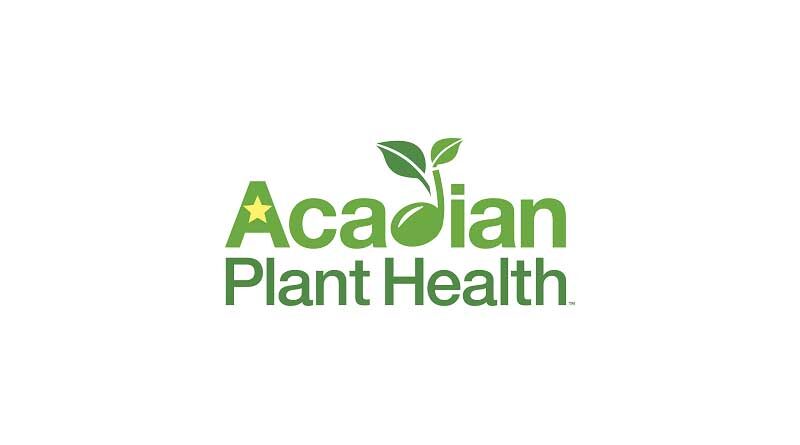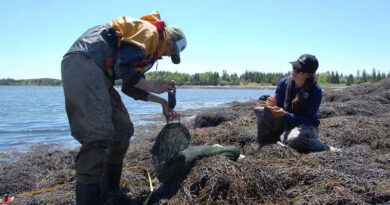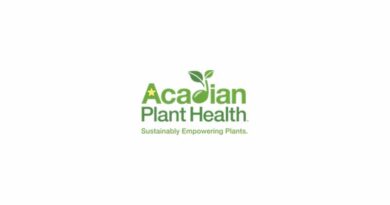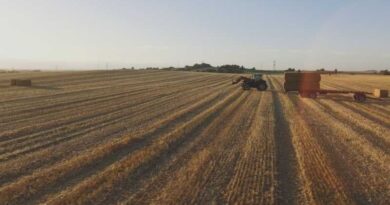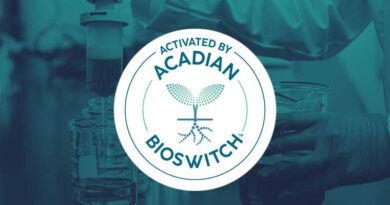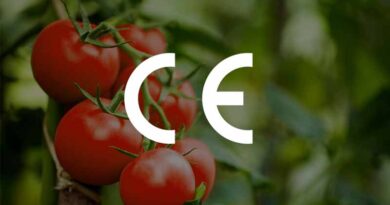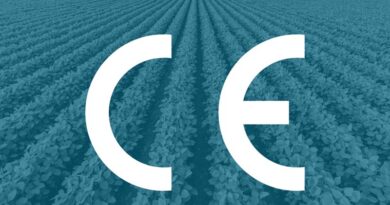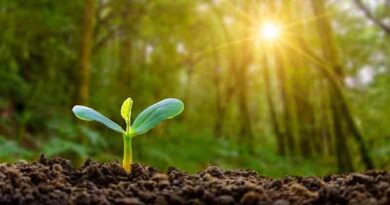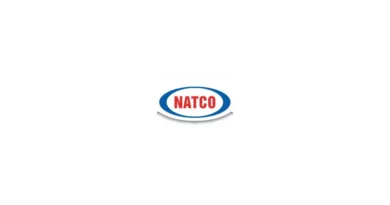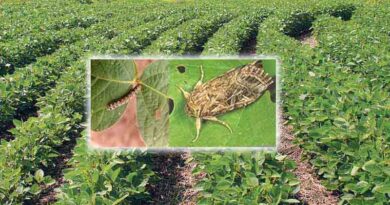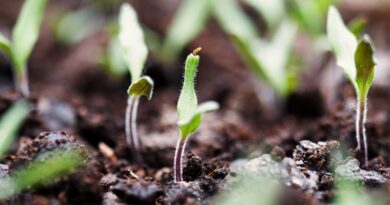Acadian Plant Health to transform Biostimulant segment with their unique sea weed extracts
Exclusive Interview: Mr. James Maude, Senior Vice President, Acadian Plant Health with Mr. Nimish Gangrade, Krishak Jagat, India.
18 July 2022, New Delhi: Seaweed extracts account for more than 33% of the total biostimulant market worldwide and are predicted to reach 894 million euros in 2022-23. The global biostimulant market size is anticipated to grow at over 12% CAGR between 2022 and 2028 due to increasing sustainable farming activities across the globe.
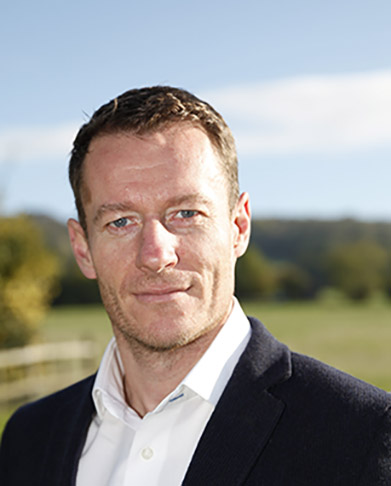
In an exclusive interview with Acadian Plant Health’s Senior Vice President, Mr. James Maude, we at Krishak Jagat, India’s National Agriculture Newspaper discussed various aspects of the Biostimulant segment, its industry perspective and how Acadian Plant Health’s exclusive weed extracts are going to bring a new perspective to the segment.
Acadian Plant Health™ offers innovative crop care solutions that improve plant vigour, growth and development while supporting sustainable farming.
Q1. How are Acadian Plant Health / soil health products different than products already available in the global market?
Acadian Plant Health™ harvests a specific seaweed species (Ascophyllum nodosum) from the North Atlantic. Ascophyllum nodosumis exclusive to the waters of the North Atlantic and is exposed to extreme weather conditions. It can thrive in very warm as well as sub-zero temperatures (-25°C/-13F in winter to +40°C/+104F in summer).
Additionally, the seaweed experiences extreme tidal variances – emersion in freezing, salt water at high tide and drought, and extreme heat at low tide. This has created a marine plant that has adapted to live in the intertidal zone by evolving its biochemical compounds to overcome stress.
A further differentiation, aside from the seaweed itself, is the use of a proprietary extraction process that ensures the end product Acadian provides is 100% Ascophyllum nodosum and that it continues to maintain the same chemical make-up regardless of harvest timing or location. This is important as biostimulants have been critiqued for lack of consistency in the past.
At Acadian Plant Health we know that not every natural product has this consistency. There is published work showing variability in claimed bioactives of other biostimulants on the market, depending on harvest season and storage temperatures/timings, which can lead to variability in the product efficacy in the field. This is definitely not desired and is likely part of the reason why some biostimulants haven’t been as readily adopted as they could have been. Our seaweed extracts are helping change that.
Q2. How is the market performance and farmer adaptability of Acadian’s soil health product?
According to a United Nations report, in Europe 970 million tons of fertile soils have been getting eroded each year, and approximately 24 billion tons worldwide due to erosion and inadequate agricultural practices. Seaweed extracts account for more than 33% of the total biostimulant market worldwide and are predicted to reach 894 million euros in 2022. The biostimulant market size is anticipated to grow at over 12% CAGR between 2022 and 2028 due to increasing sustainable farming activities across the globe. Acadian Plant Health has been growing year over year within this market.
This past year, fertilizer prices soared amid COVID-19 supply issues and the war in Ukraine. As well, new Green Deal initiatives were announced in Europe with an objective to decrease the use of synthetic fertilizers by a minimum of 20% by 2030. Sharing this new research with fertilizer companies, and the impact our seaweed extracts have on plant health, created new business relationships with these companies as they look for natural alternatives. This is a very positive move towards more sustainable agriculture and the fight against climate change.
Accordingly, Acadian has several leading brands in India used by farmers including SoliGro®, Stimplex®, Goldstar®, and Toggle® Plus. These products are utilized in various crops with different application methods including foliar, drench, and soil application or, as is recently the case, mixing with fertilizers. In the past, seaweed extracts were seen as an additive and not a necessity, so pickup in some of the agricultural markets was slower. But growers are savvy and are always looking for ways to further their business, and as they look for different techniques, they are seeing the value biostimulants, like seaweed extracts, can bring in supporting their financial sustainability and production.
Q3. What are the industry trends in sustainability solutions for addressing today’s agriculture challenges?
There is a strong consensus among the scientific community that various human activities in the past decades have led to climate change issues. This, in turn, has affected the agricultural system by impacting the quality and quantity of crop production with outcomes of soil salinity, drought problems, and abiotic environmental stress in plants.
Healthy soils are the foundation of food systems. Our soils are the basis for agriculture and the medium in which nearly all food-producing plants grow. Healthy soils produce healthy crops that in turn nourish people and animals. Indeed, soil quality is directly linked to food quality and quantity.
Soils supplies the essential nutrients, water, oxygen, and root support that our food-producing plants need to grow and flourish. They also serve as a buffer to protect delicate plant roots from drastic fluctuations in temperature. The increasing global population and the consequent rise in global demand for food will further exacerbate the need for sustainable farming solutions, like seaweed extracts, that can help improve the health of the soil.
In February 2022, Kellogg said it was investing $2 million in a five-year program paying growers to use regenerative agriculture practices to reduce greenhouse gas emissions in the United States. Nestle announced plans for a Nestle Institute of Agricultural Sciences in Switzerland to identify new agricultural technologies to help the agricultural sector transition toward a regenerative food system. General Mills is targeting 1 million acres in regenerative agricultural production by 2030, and Cargill is paying producers to adopt regenerative ag practices.
Regenerative ag practices revolve around improving the health of the soil. More specifically, regenerative agriculture seeks to move away from synthetic fertilizers, monoculture crops, and industrial production methods to techniques that minimize chemical use and enhance the health of both water and soil. The end result is that regenerative agriculture yields benefits for growers, consumers, the environment, and the world.
Q4. Share a brief about Acadian’s proprietary extracts derived from Ascophyllum nodosum marine plants?
Our research shows that our extract technology interacts with the plant to stimulate the plant’s natural defense against abiotic stressors (drought, heat, frost, salinity, and flooding). With optimized formulations, we can target the crop at vulnerable development stages and help the crop remain productive through stress periods.
Acadian Plant Health is focused on improving the resiliency of crops and improving productivity. With the advent of extreme climate events due to climate change, the ability to have products that can improve resiliency for a crop is paramount and is putting biostimulants, such as ours, as key drivers in crop input production.
Through extensive research, we now understand the mode of action within our seaweed extract. Using Nuclear Magnetic Resonance Spectroscopy, we can see our Ascophyllum nodosum produces a distinct signature, whereas with other seaweed extracts you don’t see this. With our unique extraction process, we are able to see bioactives such as Mannitol, Alginic Acid and Fucoidans carbohydrates that help support the plant throughout its life cycle.
The unique levels of these carbohydrates, and other bioactives that are uncovered in our extraction process, are what make Acadian seaweed extracts unique. Acadian Ascophyllum nodosum extract supports plants with enhanced rooting, plant establishment, improved nutritional uptake, tolerance to stress, and improved yield and quality. Overall improving the survivability of the plant and its productivity.
More recently studies from Acadian Plant Health show improved soil and root health, which can be used within regenerative agriculture practices to restore degraded soil. The research showing efficacy for improved soil health is the first published evidence using our seaweed extracts during both foliar and soil applications causing a systemic response that modulates the rhizosphere microbial community, and the first published evidence showing the effect of Acadian seaweed extracts both directly on arbuscular mycorrhizal fungus and on symbiosis mediated by the plant. This work is valuable in helping to understand the effect of seaweed extracts on soil microbial populations and improving soil health.
Q5. How is Acadian’s research and development innovating the biostimulant industry?
Acadian Plant Health has continuously invested in R&D for the past 40 years. This included building new production facilities and labs to ensure the company remains a leader in the biostimulant industry.
For R&D we have the Dr. James Craigie R&D Centre, Cornwallis, Canada 30,000 ft2 (2,790 m2) facility comprised of laboratories, greenhouses and experimental field trials, as well as theFormulation Centre of Excellence, Malvern, UK which expands on existing formulation capabilities to support new business growth, including novel and proprietary formulations for global business partners. Additionally, we have:
Research: Team of 13 scientists, 5 PhD’s and 5 cooperative students for Proof-of-Concept screening, and Mode of Action validation
Formulation: 5 scientists located in Canada & Europe + formulation development alliance with local experts
Development: 7 Dedicated Global Field Development and Technical Managers
Registration: 5 scientists supporting global registrations
Acadian has 5 manufacturing and production facilities focused around key harvesting areas, including Canada, Scotland and Ireland.
6. How are Acadian’s products being utilized in India and what should regional growers know about them?
Our company continues to build on its offering to remain in lockstep with an evolving market. It is pursuing this through a combination of strategic hires, which include leadership appointments with top-tier global crop protection company expertise, in addition to the opening of a new Malvern, U.K Formulation Centre of Excellence in December 2021, which allows Acadian Plant Health™ to optimize formulations and develop consistent, stable formulations.
For growers in the region, it’s important to remember the benefits of biostimulants. As climate change continues, events such as high heat and drought, or in some cases extreme flooding, will become more frequent.
Different from crop protection and fertilizer products, biostimulants optimize natural processes in plants. The stimulation of these natural processes increases water and nutrient use efficiency (including helping plants access nutrients in the soil), improves plant tolerance to abiotic stresses like extreme temperatures and drought, improves crop establishment with better rooting and a stronger plant, and lastly, they can improve harvest quality and yield. Biostimulants are defined by the function they provide and are an important tool in the drive towards sustainable agriculture.
Also Read: World Food Prize Foundation Announces New Director of Communications

